
Guests
Fighting between Israel and Iran has entered a fourth day, after Israel launched a sweeping, unprovoked attack. Iran’s Health Ministry reports a total of 224 people have been killed, with 1,277 people hospitalized, by Israeli attacks. Iran has responded by launching a wave of missile attacks on Tel Aviv, Haifa and other Israeli cities, killing at least 24 people and injuring more than 500.
We speak with Ali Vaez, Iran project director at the International Crisis Group, who says Israeli Prime Minister Benjamin Netanyahu “basically bombed away President Trump’s only possibility for a diplomatic win early on in his second term.” Vaez also argues President Trump is the only world leader with the ability to “stop this cycle of escalation from expanding into a much more disastrous regional conflagration.”
Iranian-born Israeli political activist Orly Noy says Netanyau launched strikes on Iran to salvage his dwindling political popularity. The Israeli people are very susceptible to believing “the imaginary threats that Netanyahu uses,” says Noy.
Transcript
AMY GOODMAN: Fighting between Israel and Iran has entered a fourth day, after Israel launched a sweeping, unprovoked attack. Since Friday, Israel has assassinated nine Iranian nuclear scientists and much of Iran’s military and intelligence leadership, including the intelligence chief and deputy intelligence chief of the Islamic Revolutionary Guard Corps, who was — they were killed on Sunday. Earlier today, Israel struck the command center of Iran’s Quds Force. Iran’s Health Ministry reports a total of 224 people have been killed in the Israeli attacks.
Iran has responded by launching a wave of missile attacks on Tel Aviv, Haifa and other Israeli cities, killing at least 24 people and injuring more than 500. One missile reportedly fell near the U.S. Embassy.
Israel attacked Iran Friday, just two days before the U.S. and Iran were scheduled to hold another round of nuclear talks. Iranian Foreign Minister Abbas Araghchi accused Israel of sabotaging the talks.
ABBAS ARAGHCHI: [translated] The Israeli government is neither seeking any type of agreement on the nuclear issue, nor looking for negotiations or diplomacy. Attacking Iran in the midst of nuclear negotiations demonstrates Israel’s disagreement with any form of negotiation. … What has transpired now is precisely an attempt to sabotage diplomacy and negotiations, and we regret that the United States took part in it.
AMY GOODMAN: This comes as President Trump and other world leaders arrive in Calgary, Canada, ahead of the G7 summit. The G7 includes the U.S., Canada, France, Germany, Italy, Japan and the United Kingdom. The Israel-Iran conflict is expected to be topping the agenda.
President Trump is posting about the conflict on his social media platform Truth Social, where he’s denied any U.S. involvement in the attacks and said his administration remains committed to a diplomatic resolution on Iran’s nuclear program, but then said something about the sides having to continue to fight.
We’re joined now by two guests. Orly Noy is an Iranian Israeli political activist and editor of the Hebrew-language news site Local Call. She’s also chair of B’Tselem’s executive board. Her new piece for +972 is headlined “Israel’s greatest threat isn’t Iran or Hamas, but its own hubris.” She’s joining us from Jerusalem. Ali Vaez is with us from Washington, D.C., the Iran project director at the International Crisis Group. His latest piece for Time magazine is headlined “The Grim Reality of the Conflict Between Iran and Israel.”
We welcome you both back to Democracy Now! Ali, let’s begin with you. The significance of the timing of Israel’s attack on Iran, that seems to be expanding on both sides, right before the U.S. was negotiating with Iran on a nuclear deal in Oman, those talks called off because of this attack, Ali?
ALI VAEZ: It’s good to be with you.
Look, I think Benjamin Netanyahu basically bombed away President Trump’s only possibility for a diplomatic win early on in his second term. The reality is that if you look at the three main files that Steve Witkoff, his special envoy for the Middle East, was working on — Gaza, Ukraine and Iran — it was only in the case of Iran that the Iranian leadership shared the political will and the objective of getting a diplomatic settlement, whereas that doesn’t apply necessarily to Putin in Russia or Netanyahu when it gets to the Gaza war. But by taking this preemptive strike against Iran, Netanyahu basically ensured that the door to diplomacy is closed for the foreseeable future.
AMY GOODMAN: And explain — I mean, the number of nuclear scientists, leadership in Iran who have been killed, the level of it seems such almost complete penetration of the Iranian leadership to be able to kill all of these leaders within Iran. Talk about the significance of that, and then the latest we heard of the media reporting, according to various sources, President Trump vetoed killing the Supreme Leader Ali Khamenei.
ALI VAEZ: Yeah. Look, there is — two things could be true at the same time. One is that Israel has deeply penetrated the Iranian system. There is no doubt that the Islamic Republic has serious intelligence loopholes that Israel had used over the years for covert operations, whether they were sabotage of nuclear facilities or assassination of nuclear scientists and IRGC commanders.
What’s impressive about this round of confrontation between the two countries is that everything is happening at the same time. We’re seeing the military attacks by Israel on Iranian territory that happened in 2024, all of these covert operations, a high degree of electronic warfare, cyberwarfare, psychological operations, all happening at the same time.
But it is also true that the Iranian leadership and bureaucracy and the political elite has deep roots. This is not a nonstate actor where, when you kill the first two layers of the top brass of the military, for instance, that it will be paralyzed. This is a state, and there are always people in the ranks who are ready to step up and fill those positions.
It is also true that Iran’s nuclear program has deep roots. It started in the 1950s. So, there is not just institutional, but also a high degree of scientific community and knowledge that exists in Iran, that cannot be easily bombed away or by assassinating a dozen Iranian nuclear scientists.
And most important of all, Amy, is the fact that the sites that matter the most to Israel, where Iran keeps its advanced centrifuges and a stockpile of highly enriched uranium, the site in Fordow, which is under a mountain, highly fortified, have been largely unaffected as a result of these strikes, because Israel does not have the kind of bunker buster weapons that are required to destroy Fordow.
AMY GOODMAN: And the significance of the reports that Trump said, “Don’t kill the supreme leader”?
ALI VAEZ: So, look, I’m always skeptical of these kind of leaks, because it’s not clear who leaked it and for what purpose. It might be that President Trump wants to signal to the supreme leader that he is not hostile and play the game of good cop, bad cop, with Israel being the bad cop here. It’s also true that it might be an Israeli-leaked leak aimed at forcing the hand of President Trump to say that he’s not opposed to Israel taking out Iran’s supreme leader, he’s not the protector of the ayatollah. So, who knows?
But the reality is that at the end of the day, from the perspective of the Iranian leadership, it does not matter, because they believe that the United States is complicit in Israel’s attacks against Iran and its senior leadership, and they believe the objective of Israeli strikes is not just to degrade Iran’s nuclear program, but to destabilize its regime.
AMY GOODMAN: I think it’s pretty clear also that the U.S. officials said they knew about this attack before it happened. I want to go to Iranian President Masoud Pezeshkian speaking during a Cabinet meeting in Tehran Sunday about the U.S. position on the attacks on Iran.
PRESIDENT MASOUD PEZESHKIAN: [translated] Israel knows no boundaries. They intrude wherever they want with permission from America. In a conversation that Witkoff had with Dr. Araghchi, he said that “Israel cannot do anything without our permission,” meaning these recent strikes are also carried out with America’s permission.
AMY GOODMAN: And this is Israeli Prime Minister Benjamin Netanyahu speaking Sunday.
PRIME MINISTER BENJAMIN NETANYAHU: [translated] We are now confronting the two greatest threats to our existence: the Iranian nuclear threat and the threat of Iranian ballistic missiles. We acted at the 12th hour, before Iran could move forward and produce nuclear weapons and before it could accelerate the development of 10,000 ballistic missiles, the kind that have hit Bat Yam and other places. In six years, they could have 20,000. These are external threats, and we are acting to stop them.
AMY GOODMAN: I want to bring Orly Noy into this conversation, the editor of the Hebrew-language Local Call, chair of the human rights group B’Tselem’s executive board, who has that new piece out for +972 headlined “Israel’s greatest threat isn’t Iran or Hamas, but its own hubris.”
Welcome back to Democracy Now!, Orly. Respond to what is happening right now, what Netanyahu just said, the bombing that’s going on. Hundreds of Iranians have been killed, overwhelmingly civilian. And at least 24 Israelis have been killed in Iran’s retaliation.
ORLY NOY: Thank you, Amy, for having me.
First, I must say that I am an Israeli citizen, but I’m also of Iranian origin, and I grew up in Iran. And it’s really, truly heartbreaking to see the footage that is coming from Iran, as well as from inside Israel. I mean, we are in yet another extremely violent cycle, and no one can anticipate where it will get.
You asked previously about the timing of this attack. And, of course, the Iranian-American negotiations is a huge part of it, but I want to emphasize the local side of the timing of this particular attack. After more than 20 months of a war of annihilation in Gaza, which started with a promise of crushing Hamas and bringing back the hostages, neither which has been achieved, neither of the goals until this point, the Israeli — Netanyahu started to lose — he started losing support among the Israeli public for that war. People started, finally, to question what it is that we are doing there. Finally, after more than a year and a half, footage from Gaza started appearing in the Israeli press with people starving, with people being bombed just for seeking food. And again, no sign of the hostages. Soldiers keep getting killed. So he started to lose support around that. The army, which is — almost has the status of a god in Israel, took a very serious strike to its prestige, not being able to defeat Hamas after such a long time. So, both Netanyahu and the Israeli army needed an immediate rehabilitation to their prestige.
Now, Netanyahu has been portraying Iran as the ultimate demon for so many years, and now this is the moment where he is enjoying the fruit of this long last campaign, because he gave the Israelis a war which they can be united around it. You can see that today even Netanyahu’s opponents, even the Israeli Jewish opposition, is so taken and so impressed by this brilliant achievement of the army and the unbelievable strikes and the technology and whatnot. And all of a sudden, Netanyahu is regaining his prestige. The Israeli army is regaining its prestige. And as per usual, it’s only a matter of time until we pay a big enough of a price in death, in devastation, before the Israeli army — the Israeli public will wake up and ask, “Why did we do that? And how does that war now serve our interests?”
AMY GOODMAN: Is there questioning even now, as more and more Israelis are killed in the retaliatory attacks, about what Netanyahu, who faces his own corruption trial, as you were saying, and more and more people are seeing the devastation of Gaza — how popular would you say this move is? And is there an acknowledgement that the — what seemed to be the deadline for Netanyahu was the U.S. and Iran agreeing on an Obama-like nuclear deal?
ORLY NOY: Well, unfortunately — and really, I’m saying it with deep sorrow — as for now, it has — he has the support of the majority of the Israeli public. People in Israel are very easy to believe the imaginary threats that Netanyahu uses. And again, Netanyahu used and built up this Iranian demon in the eyes and the minds of the Israeli public for so many years that when now he’s telling them, “I’m going to shape a new Middle East with no Hezbollah, with no Hamas, with no Palestinian Authority and with no nuclear Iran,” people are applauding. I mean, even some of the most critical journalists that used to, you know, criticize Netanyahu on a daily basis, all of a sudden are praising his courage, his ability to see into the future, his —
AMY GOODMAN: Orly, I want to bring Ali Vaez in before he has to leave. And, Ali, I wanted to go to G7, because it looks like world leaders are trying to put pressure on Netanyahu to stop the attacks. It is unclear exactly where Trump stands, who’s with them in Calgary, in Canada, since he has expressed both sides on this. Talk about this, what the U.S. needs to do right now, who clearly, everyone acknowledges, has the only lever of power that can be exerted over Netanyahu.
ALI VAEZ: That’s correct. President Trump is the only world leader who can stop this cycle of escalation from expanding into a much more disastrous regional conflagration, with direct costs for the United States and him as president, because if he gets engaged, and if there are American fatalities and casualties, if the price of energy markets, global energy markets, increase in the next few days, all of it would backfire on him politically, and especially with his MAGA base, that is deeply opposed to any additional U.S. military entanglements in that part of the world, especially if it’s aimed at regime change.
Now, the way he needs to tackle this is to — first, he needs to create distance with Israel, because there is no way that the Iranians would go back to the negotiating table and take him seriously if they are seen as him playing a double game here. And the only way he can do that is to use the leverage that you mentioned, which is the provision of offensive weapons to Israel. I think he can still stand next to Israel in defense of Israel, but he has to threaten that if Netanyahu continues this war, which endangers the 40,000 American troops in the Persian Gulf region and hundreds of thousands of Americans who live in Israel, that he would pull the plug on Netanyahu’s ability to further escalate this conflict.
And then he needs to turn to the Iranians and do two things. One is to also threaten the Iranians that if they keep fighting, the U.S. would get involved. That is exactly what ended the Iran-Iraq War in 1988. The U.S. intervened in that conflict, and that was a huge part of Iranian calculus to agree to a ceasefire. And he also has to simultaneously put an offer on the table, a nuclear deal that is reasonable, that is not one-sided, that includes generous sanctions relief, so that the Iranians, with all the mistrust, start seeing in him as somebody who’s really more interested in deal-making rather than double dealing here.
AMY GOODMAN: Thank you very much. Ali Vaez. Before we go, Orly Noy, we have just about a minute. As you said, you have a very unique perspective as an Israeli, Iranian-born, Iranian-raised woman, journalist, peace activist in Israel. Your final thoughts as the attacks go back and forth on this fourth day?
ORLY NOY: I think, in a very short sentence, both countries’ people are hostages in the hands of very corrupted, very dangerous governments. Both societies need to get rid of their prospective governments, but a war is not the way. And if anybody fantasizes that, through violence, any political change that is sustainable towards more democracy, more freedom will occur in any of the countries, he’s sadly, sadly mistaken.
AMY GOODMAN: Orly Noy, I want to thank you so much for being with us, Iranian Israeli activist, editor of Local Call, Hebrew-language media, and chair of the human rights group B’Tselem’s executive board, speaking to us from Jerusalem, and Ali Vaez, International Crisis Group, Iran project director, speaking to us from Washington, D.C.
Next up, voices from the streets as millions upon millions of people in the United States join No Kings Day protests. Stay with us.
[break]
AMY GOODMAN: “Yemayá” by MAKU Soundsystem in our Democracy Now! studio.

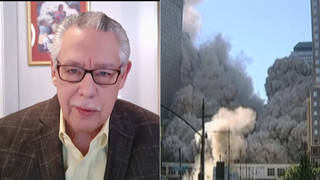

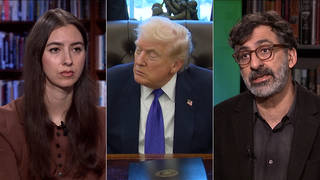
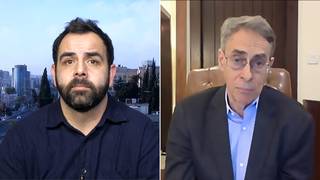





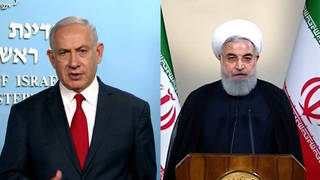

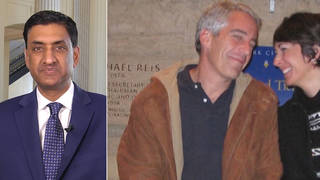
Media Options